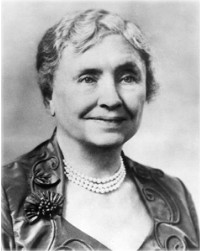|
What set Helen apart was that, until this time, no disabled person had
ever recieved more than the most rudimentary education and training. She
showed that there were no limits to what a determined person could do.
Helen graduated magna cum laude from Radcliffe College in 1904, with honors
in German and English. While still in Radcliffe, Helen wrote her first
autobiography, The Story of My Life. Other books included The
World I Live In (1908), The Song of the Stone Wall (1910), Out
of the Dark (1913), Midstream (1930), Peace at Eventide
(1932), Teacher (1955), plus numerous articles.
Helen also became quite active in politics, joining the Socialist party
in 1909, supporting trade unions and strikes, and opposing American entry
into World War I. Her Socialist activities diminished after 1921, when
she decided that her chief life work was to raise funds for the American
Foundation for the Blind, but she was always responsive to Socialist
and Communist appeals for help. As late as 1957 she sent a warm greeting
to Elizabeth Gurley Flynn, the radical labor leader, then in jail on charges
of violating the Smith Act. She also spoke out for peace, and against fascism
and racism.
Helen Keller traveled extensively, and lectured throughout the world. For
her work in behalf of the blind and the deaf, she was honored by universities
and institutions throughout the world - the universities of Harvard, Glasgow,
Berlin, and Delhi among them. She was received in the White House by every
President from Grover Cleveland to John F. Kennedy. In 1964 she won the
nation's highest civilian recognition, the Presidential Medal of Freedom.
She is also honored by the Helen Keller Fragrance Garden for the Blind
in Talladega, Alabama, and an exhibit in the Marie
and Eugene Callahan American Printing House Museum for the Blind in
Lousiville, Kentucky. Helen and Anne are both buried in the 'Role of Women'
bay at the National Cathedral,
in Washington, DC.
She
once said, "I seldom think about my limitations, and they never make
me sad. Perhaps there is just a touch of yearning at times, but it is vague,
like a breeze among flowers. The wind passes, and the flowers are content."
For specific travel information about these sites, check the "Travel
Resources" page.
|
